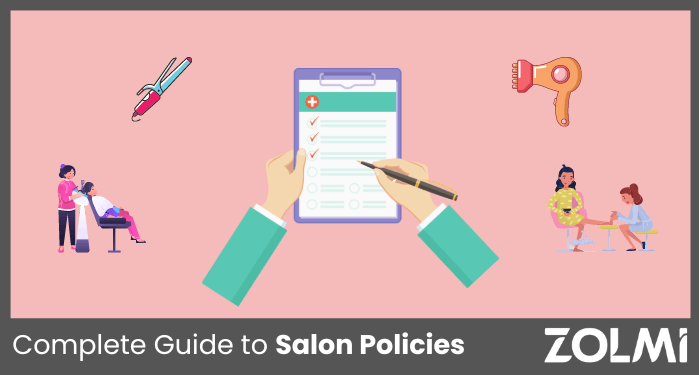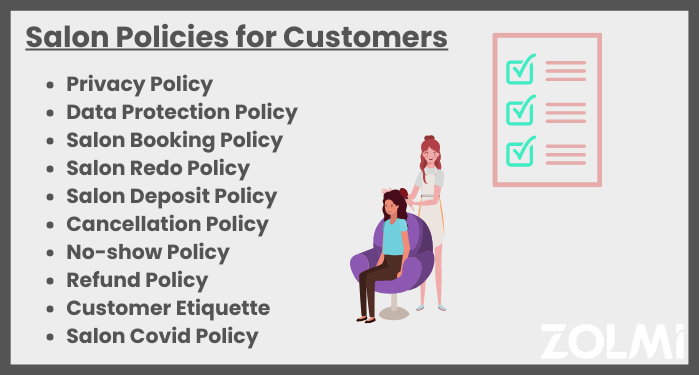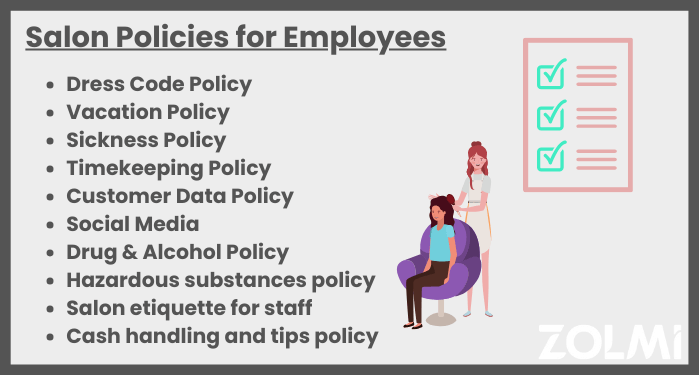Complete Guide to Salon Policies


As with any business, having clear salon policies in place is crucial for maintaining professional standards and ensuring that each client has a great experience. Your salon’s policies let customers know what to expect from each visit. They also help your employees navigate different situations and provide consistently excellent service, every time.
A salons policies and procedures can cover everything from personal matters like paid emergency health leave for your stylists, to your cancellation policy and covid salon policies. A clear social media strategy and policy are important if you want to take control of the future of your brand and your salon’s online presence.
This article outlines the importance of salon policies and gives you an overview of some useful and common policies.
Salon policies are a clear system of rules and principles that you can communicate to both clients and employees. They are put in writing and govern the day-to-day operations of a salon business. Salon policies can be based on existing laws but often also extend to cover specific situations that are unique to a salon, such as the cancellations policy or social media strategy.
Hairdressing salon policies and procedures create a safe and fair environment for salon clients and staff. They ensure that everyone receives the same excellent quality service. Having clear policies is a way to show respect for your employees- they know exactly what is expected of them so that there is no confusion. When you consistently enforce your salon’s policies, you make it easy for everyone to work together and make decisions that benefit everyone.
While they will make a manager’s job much easier, salon policies also go a long way towards helping each stylist to work confidently and safely. During appointments, your team will have a process to follow and a clear safety routine. This will help them to keep each guest happy with the service they provide, and also help staff to maintain health and safety standards. Some examples of hair salon policies for employees are salon client policies that govern the price of services or add-ons, a phones policy that limits personal cell phone use during work, and the right to refuse service to a rude or verbally abusive client.
Following a salon’s policies and procedures also helps clients know what to expect and feel more satisfied that they’re receiving fair treatment. One example of this is having a late cancellations or late arrivals policy in place: if you require at least 24 hours notice in order to reschedule appointments, and are consistent and clear about this with your clients, they’ll understand what they need to do and will be much more likely to take the time to rebook.
It’s important that you communicate everything in a way that’s clear and easy to understand. Don’t bury the information in a paragraph or at the end of an email. Remember, you want to create common salon policies that everyone can refer to easily.
For clients and guests, this might mean posting them on your salon’s website. If you schedule most of your bookings online or through social media, it may be easiest to ask them to review the policies or email them the link to these when the appointment is scheduled. Don’t be afraid to ask them to confirm or sign off that they understand your last minute cancellations policy and any fee that might result if they cancel.
For salon employees, make sure that you introduce your salon rules and code of conduct during the onboarding process. Then, have a beauty salon policies and procedures manual in the break room where everyone can access it. If you want to draw attention to any salon workplace guidelines, you could print them out and post them in an employee rest area. Make sure that you have regular staff meetings with open discussion so that everyone is aware of any changes to a policy. Employee one-to-one sessions can be helpful for creating a good relationship and addressing any concerns.

Here are some of the most popular salon policies which salon owners often put in place to cover both clients and services. These are useful for hair, nail and beauty treatment/spa facilities in general.
If your salon has a website (and most do, nowadays), this is especially important. You will need to tell clients how you will use their data, and whether you will share it with anyone else.
Every year, new laws are passed that govern how we’re allowed to use our customers’ data. This means that, especially if you live in a U.S. state like California, you have to understand how you will handle this data and market your services to clients.
For each scheduled appointment, you need to have an easy-to-follow booking policy. Will you accept bookings with less than 24 hours' notice? How about last-minute changes to appointments? Will you take walk-ins? If you’re clear about the amount of time needed to book or change any service, clients will be less likely to get upset and more likely to remember your professionalism.
If a client isn’t happy with their hair, your salon should have a redo policy in place. They should notify the salon within a specific amount of time and have options for rescheduling an appointment. Often, clients will want to visit the same stylists. You’ll need to decide how they can request this, what the time frame is, and if they need to fill in any forms or pay any fees. A redo policy is a great way to reduce the risk of having to give refunds for services. Having a clear salon complaints policy will also help you deliver a better customer experience.
Depending on the services, some salons require clients to leave a credit card deposit prior to their appointments. Decide clearly when you will require this, whether it’s refundable if there is a cancellation, and what payment methods to accept. Like a hotel reservation, many hair salons simply ask clients to book these appointments using their credit cards.
Most salons have a window in place for clients who need to cancel their appointment. Usually, clients can cancel or reschedule up to 24 hours before the appointment time without paying a cancellation fee. After this, salons will usually charge a fee for late cancellations. This can be anywhere from 25% - 50% of the service fee. Make sure that clients are aware of this: “If you need to cancel or reschedule your appointment, please let us know at least 24 hours prior. After this time, a cancellation fee of 25% will apply. If you fail to notify us, you may be charged the full appointment fee.”
This is a big one. If a client doesn’t show up for an appointment, what will you do? Most salons will charge 100% of the service fee. You may also want to consider a “three strikes” approach that prevents repeated no-shows from booking another appointment.
Just like a redo policy, a hair salon refund policy lets stylists and clients know when to expect/ offer refunds for services. Oftentimes, a client is expected to contact the salon within 24 hours with a complaint, in order to request a refund for their service.
This usually covers basic expectations that help maintain safety and a professional atmosphere. It can cover things like late arrivals, whether you can or cannot bring family/ friends to your appointment, and overuse of mobile phones during treatment.
As businesses have reopened and are adapting to the “new normal,” salon policies covid 19 has become a hot topic. These often include basic health practices such as asking clients to wear a face mask at an appointment, the use of hand sanitizer, and filling out a form for contact tracing. Some salons include a contactless payments policy, as well.
Do not miss our post Salon Refund Policy.

Your employees will appreciate this as much as each client will. A clear set of written down rules is a valuable resource for your staff. Make sure that you have a salon staff handbook that outlines all of this, and check and update each page regularly. It’s a good idea to put it somewhere that’s easy to access- for example, you could leave a copy in the break room.
A good dress code for stylists and employees covers health and safety, as well as basic appearance/ grooming. Will you require a uniform or that staff wear a specific color? What about the types of shoes (eg. are flip-flops okay)?
How much notice do employees need to give to take a vacation? Will they get extra paid vacation if they work more hours? Also, consider whether they will need to fill out a vacation request form to schedule leave.
Take a look at local laws and consider how employees should report sick time. Also, when will you require them to provide a doctor’s note?
Don’t forget to have a compassionate leave policy. Most local laws guarantee employees the right to take time off in the event of an emergency, especially when it connects to children or anyone they are caring for.
Do you expect staff to arrive on time? Should they arrive 15 minutes early to get ready? What happens if someone takes extremely long lunch breaks? Have clear expectations with respect to this, as well as any warning system or disciplinary policy set out.
Protect the data of each client. Make sure that staff understands (and sign off on) the fact that they aren’t allowed to extract or store any customer data on any devices or papers. One example of when this is necessary is when a staff member leaves and wants to take their client history and contact details with them.
What do you want to be posted on social media for future clients to see? Do you want to pre-approve staff comments about the salon? What’s your policy on communicating with clients and tagging them in posts? Salon employee policies almost always include social media use, nowadays.
This is important to guarantee everyone’s safety. Not to mention the reputation of your hair or nail salon. Examples of salon policies for employees almost always include a drug and alcohol policy. Make sure that your staff knows that it’s completely unacceptable to be under the influence of, or take drugs or alcohol while at work. This can be grounds for immediate dismissal.
Train everyone on how to handle dangerous substances and how to dispose of them properly. Check local safety regulations and include any data for hazardous materials and first-aid in your salon & spa policies and procedure manual.
These are your basic expectations of how to treat clients and coworkers. For example, whether or not mobile phones are allowed on the salon floor, what happens if they are late, or what kinds of customer service skills you expect from your staff: How should they address clients? Do you expect them to promote products during each visit?
A good cash policy will save you from a lot of headaches, later. Employees need to know that cash should be immediately added to the till and any sale or service needs to be rung in right away. Also, make sure that your procedures cover tips. They should report all of these to the manager.
It’s crucial to be consistent with your staff. Enforcing policies with one staff member and not another will only create confusion and drama. If you are firm but fair with everyone, it’ll be a lot easier to keep everyone “on board” and following the rules.
That said, you might want to have a bit more flexibility with customers, particularly those with a loyal history. For example, would you really need to enforce your salon cancellation policies when rescheduling an emergency appointment with a longtime client? You’ll need to apply good judgment and customer service skills in these situations.
A great way to make sure that your cancellation and no-show policies are automatically enforced is to invest in some salon software. This automatically takes a client’s credit card during the booking process. Then, any fees will be automatically deducted.
Your salon’s policies and procedures will help you maintain great customer service. They’ll also go a long way towards eliminating a lot of the guesswork and human error. If you’re not sure where to start, or just want to revamp your preexisting policies, many websites have free salon policies or a hair salon policies and procedures template that you can check. Use this as a starting point to build your own document to suit your needs. Just make sure that you check any local laws and regulations.
Remember, salon policies should make things easy and clear for everyone. Use clear language and try to be concise. When in doubt, communicate. You’ll be happy that you’ve put in the effort.
And if you love these ideas or have some other ideas that you've used in the past to promote your salon business, why not share them with the Zolmi community in the comment section below. We would also be delighted to answer your questions, as well.
Business Policy or Strategic Management: A Broader View for an Emerging Discipline.
https://journals.aom.org/doi/abs/10.5465/ambpp.1972.4981324
Concepts in Strategic Management and Business Policy: Globalization
https://lib.hpu.edu.vn/handle/123456789/34662
Salons are doing it for themselves! https://search.informit.com.au/documentSummaryS